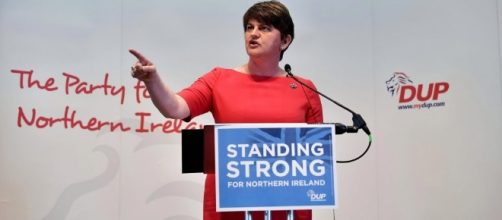After a long night of tense election results, it has been revealed that Theresa May plans to make a ‘Deal’ with the DUP in order to form a government.
Whilst the DUP are very active in Northern Island, for much of the population of Mainland Britain, they are relatively unknown. So much so that as the news came through that the Conservatives may go into coalition with them, the DUP website crashed under the pressure of people rushing to find out more about the party.
So, who Are The DUP?
Founded in 1971, the Democratic Unionist Party, DUP, is the largest party in Northern Island, akin to the SNP in Scotland.
Now headed by leader Arlene Foster, the party generally classed as possessing centre-right ideologies is often initially seen as Northern Ireland’s equivalent of the Conservative Party in England.
But this isn’t the first time that a coalition between the DUP and Conservatives has been considered. The results of this 2017 election echo the events of 2015, when a hung parliament was also predicted and speculations about a similar sort of deal were taking place. At this point, the idea of a deal between the DUP and Conservatives was met with scepticism from the likes of Nigel Farage and Nick Clegg, with much of the cynicism directed at DUP’s controversial values.
Ulster Loyalism
Historically, the DUP has been understood to be Ulster loyalist.
An Ulster loyalist political ideology is one that values links to the British monarchy and supports the distinction between Northern Ireland and the Republic of Ireland. Typically, Ulster loyalism places emphasis on Protestantism and, indeed, the DUP has close ties to the Protestant Church. Whilst in recent years the DUP’s Ulster loyalism has diminished slightly, in order to attract more Catholic and non-religious voters, the sectarian ideologies upon which the DUP was founded, still persist.
Climate Change Deniers
The DUP’s 2017 manifesto had no policies on the environment, nor climate change. But this is not entirely surprising. The DUP has a history in opposing the concept of man-made climate change.
Sammy Wilson, an outspoken climate change denier who described the Paris agreement as "a piece of window dressing for climate chancers", was appointed as Minister of the Environment from 2008-2009. In December 2016, Michelle McIlveen, the DUP’s current Environment Minister, rejected legislation that would tackle climate change, thus making Northern Island the only part of the UK not committed to cutting carbon emission.
In addition to climate change deniers, a number of the DUP’s senior members identify as creationists with a survey finding that 40% of DUP activists subscribe to this view. This includes Mervyn Storey, DUP’s Chair of the Education Committee, who believes that the Earth is less than 10,000 years old, and is part of a school of thought that reads the Book of Genesis literally.
The #DUP is stuffed with climate change deniers, homophobes and misogynists. May's alliance is a dishonourable coalition of chaos.
— GeorgeMonbiot (@GeorgeMonbiot) June 9, 2017
Anti-Abortion and Anti-LGBTQ
Despite appointing their first female leader in 2015, the DUP continues to fight against a woman’s freedom to choose an abortion. In 2016 Arlene Foster said, “I would not want abortion to be as freely available here as it is in England and don’t support the extention of the 1967 act”. As all those having and conducting abortions face imprisonment in Northern Ireland, woman and girls are forced to either travel to England and pay to have abortions on the NHS, or to seek other, medically unsupervised methods that put their lives at risk.
Foster has also come under fire for making sexist comments about her fellow ‘blonde’ MPs.
In addition to their opposition to women’s rights, members of DUP have been seen to describe LGBTQ people as "disgusting", their lifestyles an "abomination", and the party opposes marriage equality.
The DUP’s Manifesto
The DUP manifesto states that the party wants more public spending and to ‘prioritise spending on our Health Service, create more jobs and increase incomes, protect family budgets, raise standards in education for everyone and invest in infrastructure’. Overall, the party’s main focus remains on infrastructure and digital and transport connectivity, through the provision of broadband, airport and ferry services.
Coming Together in Opposition to Corbyn
As the results of the election trickled in, and the possibility of a hung parliament became a strong possibility, a spokesperson for the DUP said, ‘We have worked well with May. The alternative is intolerable. For as long as Corbyn leads Labour, we will ensure that there’s a Tory PM.’
One of the most extreme political entities in the British Isles, the 8 MPs of the DUP, is to wag the tail of Mrs May's minority Government
— Jon Snow (@jonsnowC4) June 9, 2017
Will it work?
Whilst initially the Conservatives and DUP seemed like a natural match, already we can see tensions between each party's policies and values. Foster has already stated that she wants to avoid a ‘hard Brexit’, and the two parties also clash over pensions and winter fuel payments; the DUP pledging to maintain the triple lock on pensions.
In 2015 David Cameron made it clear that he did not share the DUP’s values in regard to marriage equality, women’s and LGBT rights. In 2017, where we continue to see progressive change, and now with record numbers of female MP’s elected to parliament, whether the DUP’s controversial, sectarian values will be controlled by Theresa May and the Conservatives as they enter into an agreement is still to be seen.


